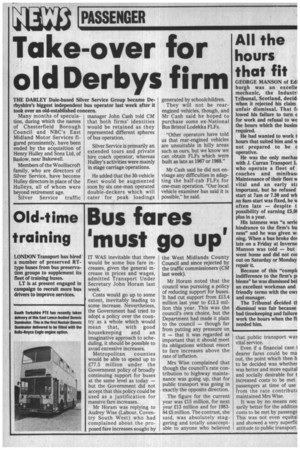Bus fares 'must go u
Page 26

If you've noticed an error in this article please click here to report it so we can fix it.
IT WAS inevitable that there would be some bus fare increases, given the general increase in prices and wages, admitted Transport Under Secretary John Horam last week.
Costs would go up to some extent, inevitably leading to some increase. Nevertheless, the Government had tried to adopt a policy over the country as a whole which would mean that, with good housekeeping and an imaginative approach to scheduling, it should be possible to avoid excessive increases.
Metropolitan counties would be able to spend up to £77.5 million under the Government policy of broadly continuing support for buses at the same level as today — but the Government did not accept that this policy could be used as a justification for massive fare increases.
Mr Horam was replying to Audrey Wise (Labour, Coventry South West) who had complained about the proposed fare increases sought by the West Midlands County Council and since rejected by the traffic commissioners (CM last week).
Mr Horam noted that the council was pursuing a policy of reducing support for buses. It had cut support from £13.4 million last year to £12.2 million this year. This was the council's own choice, but the Department had made it plain to the council — though far from putting any pressure on it — that it was regarded as important that it should meet its obligations without resort to fare increases above the rate of inflation.
Mrs Wise complained that though the council's rate contribution to highway maintenance was going up, that for public transport was going in exactly the opposite direction.
The figure for the current year was £15 million, for next year £13 million and for 198384 £5 million. The contrast, she said, was absolutely staggering and totally unacceptable to anyone who believed that public transport was vital service.
Even if a financial case I dearer fares could be ma out, the point which then h to be decided was whether was better and more equital and socially desirable for t increased costs to be met passengers at time of use from the rate contribut( maintained Mrs Wise.
It was by no means nec, sarily better for the additioi costs to be met by passenge This was not even equital and showed a very superfic attitude to public transport.
















































































































